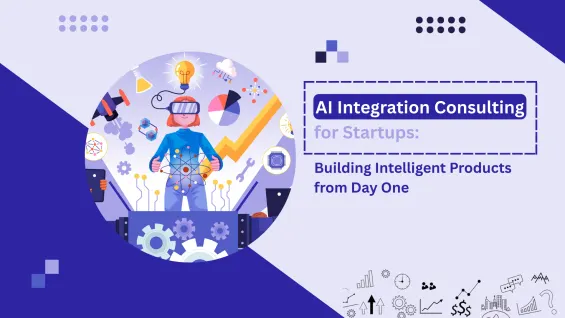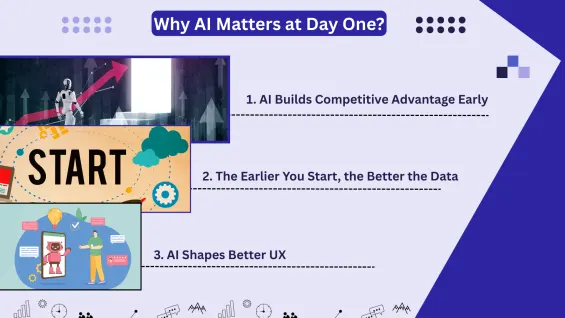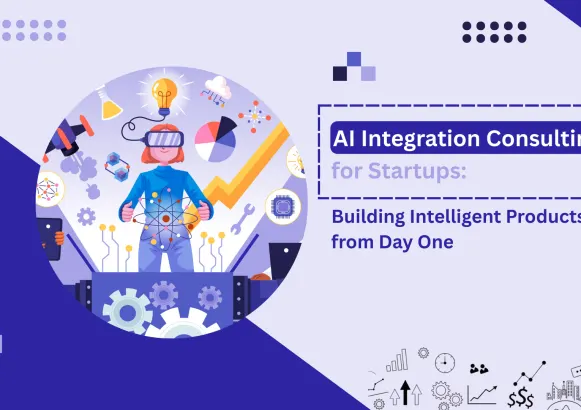This post will focus on the following topics.
- Introduction
- Why AI Matters at Day One?
- What AI Integration Consulting Actually Delivers?
- Common Mistakes Startups Make Without AI Consulting
- Conclusion

Introduction
Integrating AI from one day can be the difference between standing out and falling back. Smart features such as personal recommendations, future insights, and automated workflows are no longer optional, but for the early-stage teams, it can be hard to navigate the AI's strategic challenges. This is the place where the AI integration consultation becomes necessary.
By working with experts, startups can design intelligent products with a clear roadmap, avoid expensive errors, and ensure that their AI solutions are both scalable and in line with real business goals.
Why AI Matters at Day One?

1. AI Builds Competitive Advantage Early
Startups are successful by offering 10x better or smarter solutions than existing solutions. Integration of AI allows you to offer facilities such as privatization in real time, intelligent discovery, smart automation, and future insight correction from your MVP.
The biggest misunderstanding among the initial step starters is that AI is something you adopt later, after the product market fit, or after Series A, which is a mistake. Here's the reason:
2. The Earlier You Start, the Better the Data
AI thrives with data. Before designing your system to collect and learn from user interactions, your models will be more effective over time. Waiting for a very long time means you miss valuable training data in months or years.
3. AI Shapes Better UX
AI is not just a magical backend; This is a majority of the user experience. Smart recommendations, auto-full features, and chat assistants depend on all intelligent systems. If you build without AI from the beginning, you can design your product to add it later.
What AI Integration Consulting Actually Delivers?
1. Identifying Valuable Use Cases
You don't need AI everywhere. Consultation helps you find high-impact opportunities where AI improves the user experience or solves a real problem without inflation of your product.
2. Designing a Lean AI-Ready MVP
Consultants help you create an MVP that includes light, functional AI components. This means using pre-trained models, creating rule-based systems that develop, or basically focusing on data collection frameworks.
3. Choosing the Right Stack
AI applies infrastructure decisions and equipment that you may not be ready to take on your own. Consultants guide you about alternatives such as cloud suppliers, ML libraries (eg, TensorFlow or PyTorch), and MLOps tools, which match your budget and goals.
4. Setting Up Scalable Data Pipelines
Even simple AI features require structured, reliable data. AI integration consulting helps you design data pipelines that grow with your product and follow secrecy rules such as GDPR or CCPA.
5. UX Integration and Model Explainability
Intelligence must feel natural in your product. AI integration consulting collaborates with your design team to ensure that the explanations are reliable and do not confuse or distract users.
Common Mistakes Startups Make Without AI Consulting
Many founders recognize AI's power, but assume that they can romp later, once they have secured financing, have grown a user base, or achieve the product market. Others try to outsource the entire AI component without understanding their role in the product. These approaches often give rise to inability, poor user experience, and broken resources.

Without expert guidance from the beginning, the startups are particularly exposed to some important errors that can set them back for months or years. Here is the most common loss and how AI integration consulting helps you avoid it:
1. Building Without a Data Strategy
One of the most harmful missteps is the inability to plan how data should be collected, stored, structured, and used. The founders often believe that they “figure out the AI later", and as a result, collect the data randomly, it is in the wrong format, without labels, or beyond fragmented systems.
When it is time to implement AI features, they discover their data:
- Incomplete
- Unstructured and challenging to clean
- Biased or incompatible
- Non-compliant in line with privacy laws
Until then, it often occurs too late or is very expensive to correct.
2. Overengineering the AI Stack
Encouraged by AI's ability, some startups form very deep, very fast, complex systems that they need for MVP. They can be:
- Distribute heavyweight ML platforms before validating your use case
- Invest in infrastructure and tools that are expensive and low-cost
- Waste adaptation of models that users can never see or understand
It misses bloated products, long development cycles, and missed go-to-market windows.
3. Misunderstanding AI's Limitations
AI is powerful, but it is not a silver bullet. A startup that lacks domain skills often misjudges:
- How much data is required to train the exact model
- What kind of problems can AI really solve?
- How AI performance varies in situations in the real world
- AI requires cost and time to create a system, test, and maintain
This can lead to more features for investors or users, causing disappointing consequences, poor storage, or loss of trust.
4. Neglecting Compliance and Ethics
Since AI is becoming more underlying in everyday applications, the concerns of the user's privacy, data misuse, and algorithm bias are a lack of transparency. Unfortunately, AI for startups, especially those that are progressing quickly, often overlook these risks until it is too late.
Common ethical and legal traps include:
- Collection of user data without proper consent
- Third-party data set using hidden bias
- Training models that discriminate accidentally
- The algorithm failed to convince or justify its decisions.
In regulated industries such as finance, healthcare, or education, they can invite missteps, fines, or lawsuits. Even in low-regulated areas, they can cause known damage to users.
Conclusion
Startups can no longer consider AI as an afterthought. The construction of intelligent products from one day not only determines the basis for scalable development, but also creates a competitive advantage that is difficult to repeat. With the right AI product development consulting, early-stage companies can avoid expensive misconceptions, accelerate product growth, and unlock the real value for their users.
Whether you refine MVP or prepare for quick scaling, collaboration with experienced advisors, and ensure that your AI strategy is adjusted, skilled, and ready for the future.
Read more - Chainlink Cryptocurrency
Read Next
The following articles are related to ai integration consulting for startups: building intelligent.










